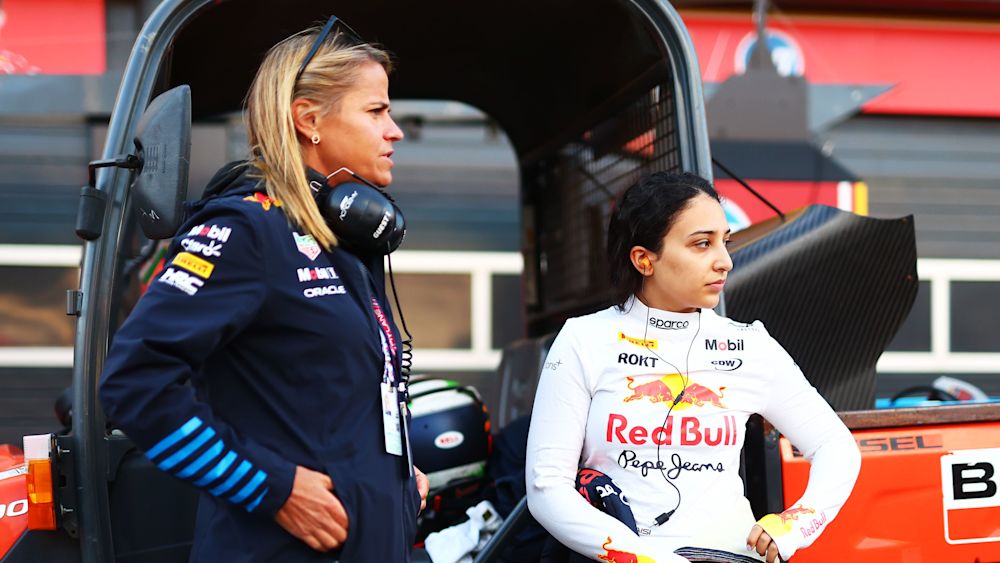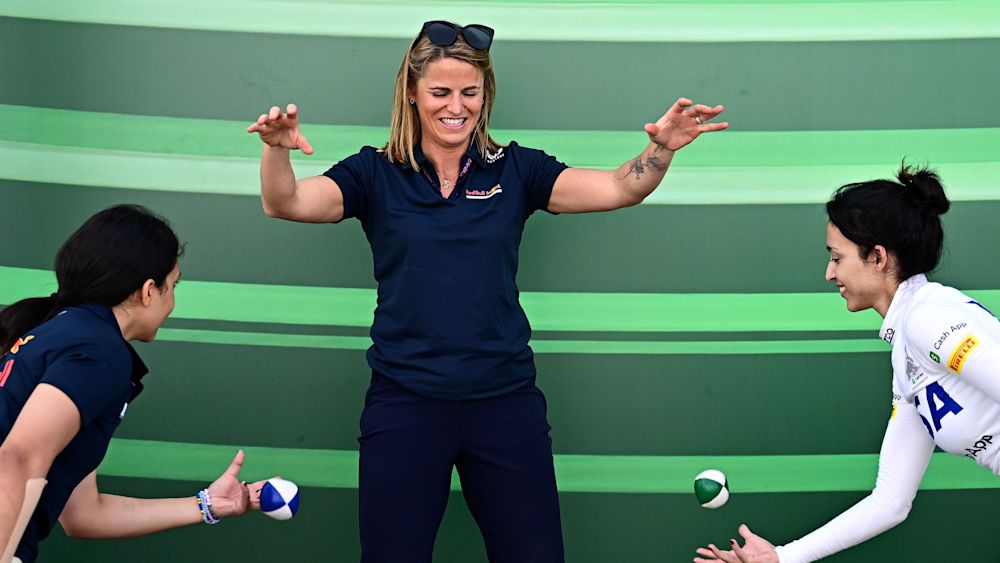Feature
'Always aim high‘ - Sarah Harrington on how she’s helping develop young drivers as the Red Bull Academy Programme Manager
Every driver must perform under pressure, both mentally and physically. In order to reach their full potential, they need to be equipped with the skills and the know-how to do so — and that’s where Sarah Harrington, Programme Manager of the Red Bull Academy comes in.
Showcasing her as part of our Pathways Into Motorsport series, Harrington’s role is focused on developing and supporting the Red Bull-affiliated drivers in F1 ACADEMY. Whilst training is a keystone of their preparations for each round, she covers a wide base of areas to ensure that her trio are able to compete at the level they know they’re capable of.
“Ultimately, my role as a Programme Manager is to oversee the whole programme with our three drivers,” explains Harrington. “My background is one of a performance coach, so very much when I'm at track, I still carry out that skillset of a performance coach. But away from the track, it is to liaise with media, to liaise operationally to make sure that whatever we’re doing, we’re able to maximise the drivers’ performance.”
She adds: “I've only been in motorsport for the last seven years. Prior to that, initially I trained as a physiotherapist. I then studied a Masters for strength conditioning, which is kind of specialised in the physical prep of athletes. I worked in a multitude of different sports and then transitioned into motorsport.
“I joined seven years ago with Red Bull to look after the race team and pit stop performance. Since then, I've worked both with Red Bull and outside of Red Bull in the junior categories, in developing drivers physically (in their) preparation for on track, and then that's transitioned to being Programme Manager this year.”

Now firmly entrenched within the motorsport environment, Harrington helps to provide a support network for the drivers at the track. With so many interconnecting factors impacting performance, she believes it’s critical to nail the fundamental basics and build a routine from that to prime them for progression up the racing ladder.
“We look in-depth at the physiology of racing or the psychology of the sports side of stuff,” she says. “Fundamentally, I think the most important thing is building that rapport with the driver. They have grown up in an environment that is quite unique in sport. A lot of them started racing at a young age and they've spent a lot of time travelling and away from homes.
“From a performance perspective, if you know that you've got that person that you can trust, to talk to and say whatever is in your head at that moment in time, I think fundamentally, it's really important.”
“Overseeing the programme is really important to be able to develop a quite a cohesive programme,” she adds. “We always look holistically to make sure that we're utilising every area from performance. I think without that role, it’s really difficult to bring it all together.
“Ultimately, across all of the categories, the foundations remain the same. As a performance coach, you’re looking at building the foundations — whether that’s just having knowledge of nutrition or managing your mindset across a race weekend and making sure that you’re physically strong enough to manage the car. Those foundations exist the same. However, obviously physically, as you travel up the categories in single-seaters, the demands increase.”
Working so closely with the Red Bull Academy drivers means that Harrington witnesses first-hand the unescapable frustrations that racing can bring. Yet there are few things more rewarding than seeing their efforts pay off with success, such as Hamda Al Qubaisi’s third-place finish in Barcelona Race 2.
“I think the challenging parts are always, as overseeing a programme, I’ve got three drivers on track,” she notes. “Drivers set their own expectations and it’s amazing when they meet those expectations, but with three drivers, there are always going be times where they don't. All three drivers have put in so much work, so it was really nice to see Hamda’s podium.”

Whilst Formula 1 might be the pinnacle of racing, the industry extends far beyond it, or even single-seaters. Passing on some words of wisdom for those looking to work in motorsport, Harrington stresses the importance of self-belief and understanding how broad the environment is.
“When you’re building a career, I think it’s a really common trait to not believe that you can manage it,” explains Harrington. “I think whether it’s (in your) career or in sport, always aim high! “I think communication skills are pretty key. Ultimately, I do bring the background of being a performance coach to that, which I think has been really helpful in this scenario, certainly in helping the drivers in terms of managing all the off-track side of stuff. Communications skills, working in a team are really important.”
She adds: “Being a performance coach or being a physio in sport, or any of that, it’s a hard journey. It’s competitive, there are lots of people wanting those positions. A piece of advice that I would give to somebody looking to get into the industry would be to just get as much experience as possible, reach out to as many people as you can and that’s across the board. Whoever I’m speaking to, I’d say exactly the same.
“As much as we’re competing on the F1 stage, I think it’s easily forgotten that there are many more other categories in motorsport. Whether it’s endurance racing, whether it’s karting — go and experience those things because that’s all part of understanding the pathway into F1.”
For the young girls and women watching the action unfold on screen, the drivers and those working behind the scenes are helping to inspire the next generation. With the aim of showcasing opportunities on and off the track at the heart of the work F1 ACADEMY does, Harrington is enjoying seeing and being a part of the impact that the series is having.
“If you look at it from the drivers, they’re certainly creating the role models that are going to bring about the new generation of drivers, so that’s a really big key pathway. In terms of working in the industry, I love the fact that we’ve got work experience people here.
“I think you are really starting to see how many different roles exist. To be involved in F1 ACADEMY, it’s mega. From all of our side, it’s outdone our expectations. Watching days like this where you’ve got crowds coming into the paddock and meeting all the drivers, I think it’s a real platform to progress females in motorsport.”